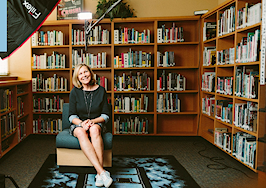In this monthly advice column, Marketing Mastermind Christy Murdock Edgar answers three burning questions from the real estate industry at large. This month’s topic: Facebook and Instagram marketing.
Facebook is all over the news lately, and I have spent the past month or so looking at the controversial social media platform from multiple perspectives. Love it or hate it, many real estate agents and brokers are always looking for new ways to make Facebook work for their business.
This month, I thought it would be fun to answer a couple of questions just for you Facebook folks out there.
Questions of the day
Question 1, from Nick Woodward, West Hartford, Connecticut:
What is the best content to put in Facebook ads?

Photo by Jaelynn Castillo on Unsplash
It really depends on what you mean by content. Do you mean what type of content? The central message? The call to action? The design and appearance of the content? All of these have a big impact.
In addition, you need to think about what result you’re looking for:
- Are you just trying to build your brand’s profile?
- Build engagement with your user base?
- Create warm leads for a separate retargeting campaign?
- Convert people who are already familiar with your brand?
The long answer is: value-added content gets results. If your Facebook ad is simply a pitch for your business, it probably won’t have much effect on conversion unless you’ve identified an audience that is ready to work with you already and just needs to sign up.
If you’re trying to lead gen, a robust content marketing plan — of which social media advertising is only part of the story — will pay dividends.
What are you an expert at? What pain points can you ameliorate for a potential client? Create a video that offers value on top of value, to answer the viewer’s questions and give them a huge takeaway — whether or not they decide to work with you. Ah yes, there it is. The key is letting go of the result and just giving pure value.
If you do that, you will draw in fans who buy into you and what you are offering. They may not sign a listing agreement tomorrow, but they’ll start paying attention to your content and relying on your expertise. Over time, you’ll build a strong base of potential clients among these already enthusiastic followers.
In terms of the appearance of your content, here are some tips:
- If you’re working with still photos, go for bright colors and compelling images. Humorous images, unusual images, and, of course, the ever-clickable puppies and kittens work well.
- If you’re working with video, ensure you craft the static image people see before they hit play. You don’t want the still to be an awkward picture of you mid-sentence or a blurry transitional shot.
- Spend time on your headline. Make it short, compelling and meaningful. Don’t try to build suspense with a vague or confusing headline. People won’t click through to find out what it means, they’ll just keep scrolling.
Question 2, from Chicago’s Sonia Figueroa:
What about chatbots?

Denys Prykhodov / Shutterstock.com
Chatbots are simple automations that many of us interact with every day. For example, when you look up something at your cable company’s website, the pop-up that offers to chat with you is often a bot that is programmed to answer some basic questions and provide some customer support.
The upside of chatbots is that visitors feel engaged with and are able to interact with your website or social media platform. The downside? Some chatbots aren’t very smart, aren’t very fast, and have only a limited ability to answer questions and provide service.
Chatbots in a messaging app like Facebook Messenger are able to respond with targeted messages when visitors click on an ad or content on your Facebook page. They can answer basic questions or at least buy some time until you can answer the question personally.
Because many potential clients make their decisions within minutes (if not seconds) of finding you, the most responsive agent is at a tremendous advantage. Chatbots help make you more responsive.
If you want to outsource the creation of your chatbot, Facebook has a list of recommended development partners who can help. They’ll talk to you about your business and what you’re trying to accomplish and help design the right bot for your needs. They can also help with ideas for promoting your bot’s capabilities.
If you’re particularly tech-ish you may want to take a stab at creating your own chatbot for Messenger. Services like Dialogflow and Wit.ai offer you the opportunity to design-it-yourself, saving you money and ensuring you create a truly custom experience.
If you’re all-in on Facebook and get a lot of inquiries there, a Chatbot is probably well-worth exploring. If your Facebook page is just a perfunctory part of your social media plan, you may want to wait for the technology to develop a little further.
Question 3, Cornelius and Ainslee Charles, Ventura County, California:
As more and more Realtors focus on Facebook, are there any other social media channels that might be effective in reaching potential homebuyers or sellers?

Photo by Luke van Zyl on Unsplash
For many real estate agents, brokers and affiliated pros, Instagram is the place to be for real estate. Because of its emphasis on visuals and its high levels of viewer engagement, Instagram is a natural for sharing listing photos, promotional content and more.
And with 60 percent of Instagrammers saying they learn about products and services on the platform, and an audience that skews younger, you may find that Instagram is the next frontier in social media marketing.
Like its parent company, Facebook, there are a variety of ways to target your Instagram posts, including the option to promote already successful posts. If you’re a big video creator, you’re likely to see a lot of love on Instagram as well, with data showing that more and more Insta users are engaging with video.
Here are some tips to make your posts stand out and garner more likes and more follows:
- Don’t post too often. Unlike Twitter, the point with Instagram is to curate your posts so that you’re always presenting something well-worth seeing. For many businesses, one a day or two a day posts — at optimal times — should be enough.
- Brand your images. Use a graphic design platform like Canva to add your logo, email address, website or other element to your image. It doesn’t have to be prominent, and it shouldn’t be intrusive, but it does ensure that if someone shares that photo you’ll get the credit.
- Check your grid. Ideally, there should be a cohesive look to your images. You may want to accomplish this by always using the same filter, focusing on images in a particular color scheme or otherwise bringing some order to your feed. The point is to look at the grid of your posts and have them all look like they come from the same place. By building a well-defined look for your brand, you’ll find that people can spot your post even when quickly scanning their feed.
- Focus on composition and symmetry. Particularly effective posts are often those which are carefully composed and have a somewhat artistic quality. Think a Wes Anderson movie — artfully designed color schemes and an emphasis on symmetrical layouts.
- Spend some time on your caption. Longer captions are better than shorter captions, and careful hashtagging is a must.
- Check out the hashtags for your space. Think #realestate, #realestateinvesting and #luxuryrealestate. See what’s going on in their feeds. Make thoughtful comments on other people’s posts, and see if you can spark a conversation. This is a good way to draw people to your account who are genuinely interested in what you have to say and will follow you with interest.
As it grows by leaps and bounds — and engages that younger demographic — Instagram is poised to become a real estate agent’s best friend. By building your presence now, you’ll be a major player when the stragglers get on board.
Have a question you’d like answered or a topic you’d like covered? Send your marketing, branding, blogging and social media queries to our Marketing Mastermind at Christy@writingrealestate.com, and she’ll bring you great advice, helpful hints and expert insights.
Christy Murdock Edgar is a Realtor, freelance writer, coach and consultant with Writing Real Estate in Alexandria, Virginia. Follow Writing Real Estate on Facebook or Twitter.








